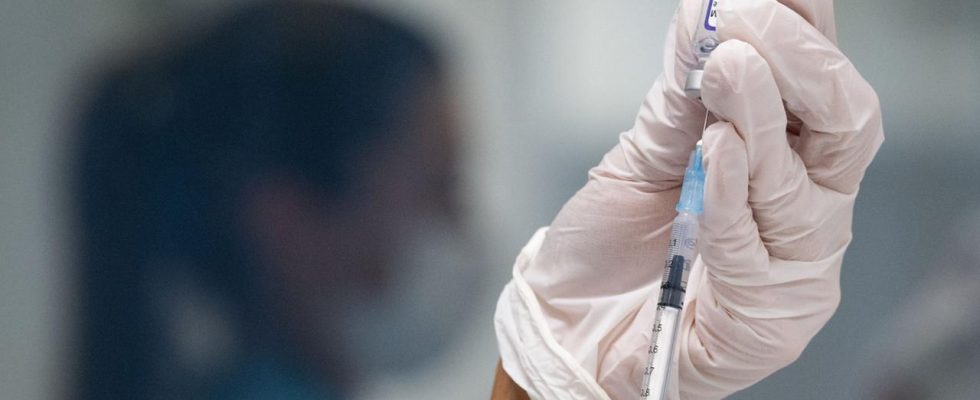An adapted Covid-19 vaccine has recently been on the market. So far, however, demand has been limited. And spontaneous vaccinations are often not possible.
In Frank Kennel’s practice in Gönnheim, Rhineland-Palatinate, the phone is currently ringing more frequently than usual. Many patients are calling about a corona vaccination. But not because they really wanted to be vaccinated, explains the doctor. But because they don’t know whether they should get vaccinated.
There is great uncertainty among people, says Kennel – and so is vaccination fatigue. Most of his patients are happy if they don’t need another vaccination.
The Standing Vaccination Commission (STIKO) recommends vaccination with the adapted Covid-19 vaccine for people aged 60 and over, residents in care facilities, people with certain previous illnesses, nursing and health care staff and relatives of high-risk patients. But only if they have neither been vaccinated against Covid-19 nor been infected with the coronavirus in the past twelve months.
But even those who meet all of these criteria often shy away from vaccination, says Kennel. To do this, they would willingly have their blood taken – in the hope that, thanks to previous vaccinations or infections, there would still be enough antibodies in it that a vaccination would not be necessary.
General practitioner Frank Kennel notices a great deal of vaccination fatigue among his patients.
No rush for vaccinations
There is also no talk of a rush for corona vaccinations in Barbara Römer’s group practice in Saulheim near Mainz. The doctor and her colleagues treat an average of 3,500 patients per quarter. They currently only need one vial of the Covid 19 vaccine from BioNTech/Pfizer per day. This contains six doses of vaccine, which is currently the only adapted vaccine on the German market.
The European Medicines Agency (EMA) has now approved Moderna’s adapted vaccine, but it cannot be ordered until the beginning of October. How great the demand for the Moderna vaccine will be from practices is questionable anyway. Because practices or pharmacies have to pay for this vaccine.
The federal government will cover the costs for the adapted vaccine from BioNTech/Pfizer, thanks to a so-called acceptance agreement between BioNTech/Pfizer and the EU.
Vaccine so far only in six doses
Family doctor Römer basically has no problem at all with the BioNTech/Pfizer vaccine. On the contrary, she even calls him “our Meenzer Stöffchen” with a loving laugh. BioNTech has its headquarters in Mainz, and Römer’s practice is not too far away.
However, the fact that the “Mainzer (vaccination) substance” is only available in doses of six causes the doctor a lot of effort and therefore also distress. If the vial, i.e. the bottle with the vaccine, is pierced in the morning, it must be used within twelve hours. And that causes stress for Römer’s practice team.
“If you have a patient in the morning who wants to be vaccinated against Corona, then you have to make sure that they somehow get five others together during the day,” says the doctor. “Otherwise you have to throw away the vaccine. Now I could of course say, the federal government pays, I don’t care, but that doesn’t correspond to my idea of careful use of resources.”
The fact that the BioNTech vaccination can only be administered in packs of six makes everyday practice difficult for Barbara Römer.
Spontaneous vaccinations not possible
The result: Patients cannot spontaneously be vaccinated against Corona in their general practitioners’ practices. And the practices have additional organizational and coordination workload because they always have to try to get six people who want to be vaccinated together at once.
“This is an additional burden that we cannot use in times of a shortage of skilled workers and increased infections,” says Römer.
Demand for single doses
The doctor, who is also chairwoman of the Rhineland-Palatinate Association of General Practitioners, demands that individual doses from BioNTech/Pfizer be made available to practices as quickly as possible. Anything else would further slow down the vaccination campaign, which is currently already sluggish.
The fact that Moderna’s recently approved vaccine will be available in single doses does not solve the problem – because the EU does not have a purchase agreement with Moderna and the federal government does not cover the costs for these vaccinations. The umbrella association of statutory health insurance companies assures that the health insurance companies will also pay for vaccinations with Moderna – but only if doctors, after consulting with those wishing to be vaccinated, consider this to be medically necessary.
Single doses in preparation
The Mainz-based biotech company BioNTech knows that many doctors prefer to vaccinate in single doses for organizational reasons. A spokeswoman emphasizes that the wish is completely understood. Preparations are currently underway for the introduction of single-dose containers for the COVID-19 vaccine from BioNTech/Pfizer, including for the US market.
As soon as there is any news about this for the German market, it will be announced at an early stage. However, due to the organizational effort involved in filling and packaging the vaccination serum, it can be assumed that single doses will be significantly more expensive than the previous six-doses.
And so the employees in the practices continue to try to get enough people willing to be vaccinated every day so that as little vaccination serum as possible is thrown away. A product that not so long ago was as coveted by many as pure gold.

